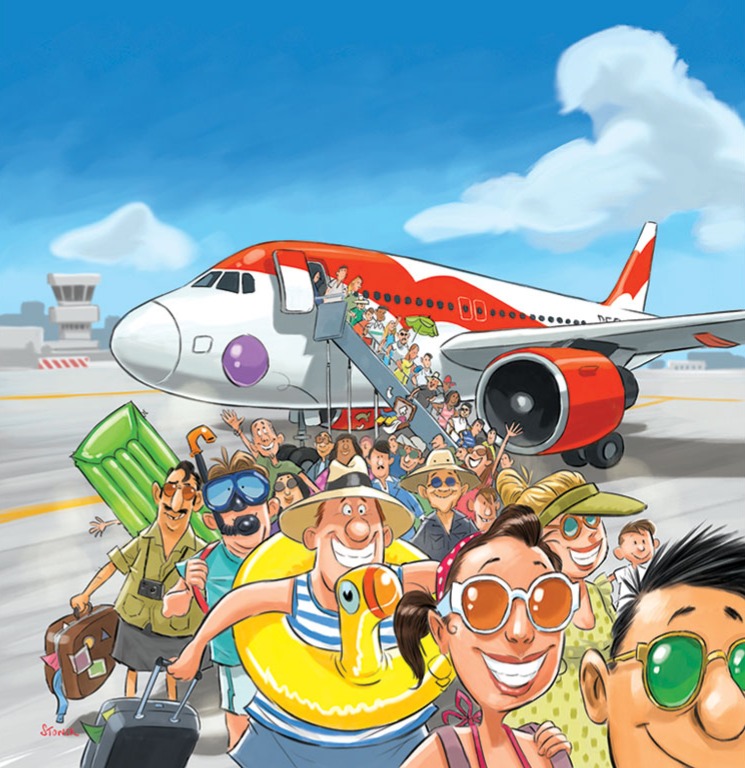How to invest in the travel industry's boom as tourists get back on the road
The travel industry is in rude health, despite uncertainty about the global economy, Donald Trump’s policies and geopolitical concerns. Smart investors should buy in now


Get the latest financial news, insights and expert analysis from our award-winning MoneyWeek team, to help you understand what really matters when it comes to your finances.
You are now subscribed
Your newsletter sign-up was successful
Want to add more newsletters?
In spite of a constant barrage of negative headlines in the press, covering everything from geopolitical tensions and global economic jitters to concerns about overtourism, the world’s travel industry is quietly cementing its position as a remarkably resilient and lucrative sector. Far from being a perilous investment, many industry leaders and financial analysts contend that the post-pandemic rebound, coupled with significant structural shifts in demand and the pervasive integration of advanced technology, has transformed large segments of the industry into “just one great big cash machine”, as Frank Holmes, chief executive and chief investment officer of US Global Investors, puts it. This confluence of factors, he argues, positions travel as “one of the all-time great contrarian opportunities”.
Dispelling short-term apprehensions about the travel industry
While acknowledging a degree of softening demand in certain segments, particularly in the immediate term, industry observers largely consider current anxieties to be overstated. Paul Middleton, head of global equities at Mirabaud Asset Management, recounts recent conversations with hotel executives who conceded that “some of the macroeconomic fears were leading to a reduction in the number of bookings that they were getting, to the extent that they were having to take down their guidance about future earnings”. He also notes the genuine “frustration” expressed by local residents in cities such as Barcelona, which are grappling with the inflationary pressures of overtourism.
However, Middleton maintains that this dip in advance bookings does not necessarily portend a decline in actual travel. Consumers, he suggests, are simply waiting for longer and booking at the last minute, rather than three months in advance. They may be concerned about events in the Middle East or the global economy, but “if they still have a job by the time summer comes, they will still be going on holiday”, he says. Furthermore, the prospect that cities will enact draconian measures to curb tourism is deemed unlikely to materialise, given the substantial “economic benefits that come with it”.
Try 6 free issues of MoneyWeek today
Get unparalleled financial insight, analysis and expert opinion you can profit from.

Sign up to Money Morning
Don't miss the latest investment and personal finances news, market analysis, plus money-saving tips with our free twice-daily newsletter
Don't miss the latest investment and personal finances news, market analysis, plus money-saving tips with our free twice-daily newsletter
This sentiment is echoed by major hotel operators. Simon Vincent, president for the Europe, Middle East and Africa sectors for Hilton, reports “no evidence of significant reduction in traffic from the US to Europe, or to the Middle East”, and is in particular anticipating “a strong summer of US travel into Europe”.
Gianvito Mangano, general manager and director of operations for Canne Bianche, a luxury boutique hotel in Puglia, offers a slightly more cautious perspective, acknowledging a current reduction in US bookings. Yet he attributes this to a shift towards “booking at the last minute rather than way in advance”, aligning with Middleton’s assessment and projecting sustained medium-to-long-term growth from the US market.
Ultimately, market fluctuations, whether driven by “geopolitical factors or consumers’ confidence”, are inherent in the business, says Michael Stiasny, the head of UK equities at M&G Investments. But whatever is going on in the short term, the innate human “propensity to seek out new experiences and other countries” will not fade. Beyond the temporary disruptions, “over the long-term travel should keep on growing”.
The travel industry's post-pandemic resurgence
The travel industry’s remarkable resilience is underscored by its vigorous recovery since the pandemic. Simon McCulloch, the chief growth officer at travel insurance provider Staysure, points to data from the Association of British Travel Agents, revealing that more than half of British individuals took holidays abroad in both 2023 and 2024, a significant rebound from a low of 16% during the pandemic’s peak.
Jean-Hugues de Lamaze, a portfolio manager at Ecofin Global Utilities and Infrastructure Trust, confirms this trend, observing that European air traffic has “broadly recovered to pre-Covid levels and in many cases surpassed them”, a pattern replicated across most developed markets, including the US. Some of the changes the pandemic brought in its wake are likely to persist, such as the rise of virtual meetings and hybrid work, which means “less frequent and leaner” travel for business purposes. But this has been more than offset by a strong surge in leisure travel, fuelled by “more flexible work agreements and pent-up demand”.
Emily Foshag, the head of listed infrastructure at Principal Asset Management, concurs, positing that increased leisure travel has more than compensated for any decline in the number of business-related journeys. “If I and billions more like me are spending more time at our desks on Zoom during our professional lives, we’re going to be more willing to take a holiday that requires some time in the airport and a long-haul flight,” she says. This shift is evident in the performance of airports that cater to leisure travellers, such as those in Spain, which are now reporting traffic “materially above pre-Covid levels”.
And not all agree on the extent even of the downturn in business travel. Hilton’s Simon Vincent sees “business travel pretty much as it was” before the Covid pandemic hit. Although larger corporations may be “a little more selective” about what business travel expenses they will agree to, he argues that small and medium-sized businesses “still prioritise that important face-to-face connection”. Furthermore, major conferences and events remain “alive and kicking”, with record attendance figures, such as at the World Retail Congress held at the London Hilton on Park Lane recently. Vincent also highlights the growing so-called “bleisure travel” trend, where business trips are increasingly combined with leisure activities.
Demographic shifts affecting the travel industry
A significant structural driver of sustained growth in the travel sector is the evolving spending patterns of the global middle class, particularly in emerging economies. Paul Middleton of Mirabaud Asset Management posits that, as incomes rise, both at national and individual levels, a greater proportion of expenditure is directed towards services, notably healthcare, education and travel. “After all, there’s only so many goods that you can buy,” he says, whereas our appetite for thrilling experiences is more expansive. Consequently, the travel industry is projected to outpace overall global economic growth, expanding from 11% of global GDP today to approximately 16% within the next decade, with a substantial share of this growth originating from Asia, particularly China.
Frank Holmes of US Global Investors is also notably bullish on the transformational impact of Chinese tourism. In recent months, “many of the big Chinese tour operators have been buying large blocks of hotel rooms in prime European tourist destinations”, in some instances securing entire hotels. While their focus has primarily been on second- and third-tier hotels – that is, in the middle and upper-middle parts of the market – this rising demand has also bestowed “incredible pricing power” upon luxury hotels, leading to room prices “doubling in less than a year”.
Beyond organised Chinese tour groups, other emerging markets are also contributing to the surge. Gianvito Mangano of Canne Bianche reports a spontaneous increase in Brazilian visitors, prompting his hotel to forge partnerships with Brazilian travel companies and participate in Latin American trade shows.
The inclination to spend more on travel is not, of course, just confined to emerging markets. In developed economies, the younger generations are taking more holidays than their parents and elder siblings. Holmes attributes this partly to a post-pandemic reaction on the part of the generation that arguably suffered the most during the Covid lockdowns and that now wants to get out and see the world. However, he also identifies a broader, pre-Covid generational shift away from goods and towards experiences – a trend he believes is “not going away”.
While acknowledging potential challenges, such as younger travellers’ growing concerns about sustainability for the airline industry, Michael Stiasny of M&G Investments affirms that younger people “have higher expectations about the number and quality of travel experiences, not least because they have grown up in a world where travel is within reach for a much bigger chunk of the population than it was 30 or 40 years ago”.
Profit catalysts within the travel industry

The profitability and revenue generation of the travel industry are being significantly enhanced by the strategic deployment of artificial intelligence (AI). Initially, airlines leveraged AI to drastically reduce lost luggage incidents, leading to an 87% decrease in missing bags – a crucial improvement given its direct impact on passengers’ satisfaction, as highlighted by Frank Holmes. This application has since evolved into more sophisticated uses, such as optimising scheduling through the analysis of historical and real-time demand data. This allows airlines rapidly and accurately to adjust flight frequencies, destinations, aircraft types and pricing.
If a route underperforms, as Holmes explains, AI can enable swift transitions from larger to smaller aircraft, or even the cancellation of flights. Conversely, surges in demand can trigger the addition of extra flights and dynamic price increases. This capability is instrumental in preventing wasted resources on underutilised aeroplanes during off-peak periods and mitigating the need for desperate price discounting. These techniques are now being adopted by the hotel industry with similar success, transforming the traditional “high season and low season” into a “high season and an even higher season”.
While predictive and dynamic pricing models have proved controversial, particularly in live events, technology is also greatly improving the customer’s experience, notes Hilton’s Simon Vincent. This encompasses everything from streamlined check-in processes and room allocation to the convenient ordering of amenities via loyalty applications. Indeed, Hilton’s customers can now utilise technology to customise their stay down to precise details, from preferred floor for a room and outside view to the softness of the pillows.
Paul Middleton of Mirabaud Asset Management further observes how technology is reshaping holiday bookings. The proliferation of choices for modern travellers in the form of book- and price-comparison sites has fuelled the ascent of online travel agents (OTAs). These platforms not only consolidate options, but are increasingly using AI to curate suggestions for personalised trips. OTAs do take a commission from hotels, but their vast data repositories enable them to execute “dynamic pricing quicker and more effectively than any single hotel or chain”.
From an investment perspective, OTAs are an attractive proposition due to their substantial economies of scale. Their predominantly fixed-cost structures mean that platforms capturing a significant market share can offer superior value to consumers, creating a “natural moat” against competition and safeguarding profit margins.
The best travel industry investments to buy now
The easiest way to buy into the travel boom is through an exchange-traded fund (ETF), such as the US Global Investors Travel UCITS ETF (LSE: TRIP). It is run by Frank Holmes and Joanna Sawicka, and follows a “smart-beta” strategy, weighing the holdings in the portfolio based on momentum and earnings (as opposed to market capitalisation alone). At the present time, the fund has 50 holdings, around 40% of which are airlines, which account for the top-four holdings (ICAG, Delta, United Airlines and Ryanair). Hotels make up significant chunks of the portfolio, too. The ETF has a total expense ratio of 0.69%.
The hotel industry generally obviously stands to benefit from the growth of tourism, as well as from the backlash against Airbnbs and short-term holiday lets. One of the biggest international hotel brands (and the tenth-largest holding in the US Global Investors ETF) is Hilton Worldwide Holdings (NYSE: HLT), which owns and franchises a large number of hotels around the world. It trades at 29.7 times expected 2026 earnings, but this is justified by strong growth prospects, especially outside the US. There are around 3,600 new hotels in the pipeline, which should bring the total number to more than 12,000.
Another way to buy into the travel boom is to invest in an online travel agent (OTA). One of the largest of these is Booking.com, which is run by Booking Holdings (Nasdaq: BKNG). Booking Holdings also operates a wide variety of other travel websites, including Priceline, Cheapflight and restaurant reservation service OpenTable. It experienced a large drop in revenue during the pandemic and its immediate aftermath, but has grown revenues by nearly two-thirds since 2019. Profits have gone up by a similar amount. Despite this, the stock trades at a more than reasonable 23.2 times 2026 earnings.
Mirabaud’s Paul Middleton agrees that Booking Holdings has a good business model, but he is even more bullish on Chinese online travel agent Trip.com (Nasdaq:TCOM). He believes it will benefit from the fact that demand for travel is growing far more strongly in China than elsewhere. Another big attraction is its valuation. It has had a similar record to Booking Holdings since 2019 in terms of revenue, but has outperformed it in terms of growing its profits. It trades at a much more modest 14.5 times 2026 earnings.
More people taking holidays and travelling will mean more people passing through train stations and airports. This is good news for SSP Group (LSE: SSP). SSP makes its money operating restaurants, bars, lounges and convenience stores, including those operating under their own brands, such as Burger King and Starbucks, mainly in train stations and airports. It operates in 625 locations in 38 countries. Revenue is now more than 20% higher than it was in 2019, and is expected to keep growing by around 4%-5% a year. Despite this, the stock trades at the bargain-basement level of 12.5 times 2026 earnings.
Many airports are themselves listed on global stock exchanges and Emily Foshag, manager of the Principal Asset Management Global Listed Infrastructure fund, thinks that buying into one in an area that receives a lot of leisure (as opposed to business) travellers could be a lucrative investment. As stated above, she specifically cites Spain as a country that should do well in. Spain’s largest listed airport is Aena (Madrid: AENA). Its profits are now a third higher than they were in 2019, and are expected to keep on growing. The shares currently trade at 15.2 times 2026 earnings, and offer a dividend yield of just under 5%.
This article was first published in MoneyWeek's magazine. Enjoy exclusive early access to news, opinion and analysis from our team of financial experts with a MoneyWeek subscription.
Get the latest financial news, insights and expert analysis from our award-winning MoneyWeek team, to help you understand what really matters when it comes to your finances.

-
 Review: Pierre & Vacances – affordable luxury in iconic Flaine
Review: Pierre & Vacances – affordable luxury in iconic FlaineSnow-sure and steeped in rich architectural heritage, Flaine is a unique ski resort which offers something for all of the family.
-
 Could you get cheaper loans under ‘significant’ FCA credit proposals?
Could you get cheaper loans under ‘significant’ FCA credit proposals?The Financial Conduct Authority has launched a consultation which could lead to better access to credit for consumers and increase competition across the market, according to experts.
-
 Review: Pierre & Vacances – affordable luxury in iconic Flaine
Review: Pierre & Vacances – affordable luxury in iconic FlaineSnow-sure and steeped in rich architectural heritage, Flaine is a unique ski resort which offers something for all of the family.
-
 8 of the best properties for sale with minstrels’ galleries
8 of the best properties for sale with minstrels’ galleriesThe best properties for sale with minstrels’ galleries – from a 15th-century house in Kent, to a four-storey house in Hampstead, comprising part of a converted, Grade II-listed former library
-
 The rare books which are selling for thousands
The rare books which are selling for thousandsRare books have been given a boost by the film Wuthering Heights. So how much are they really selling for?
-
 What is physical AI, and how can you invest in it?
What is physical AI, and how can you invest in it?Artificial intelligence is increasingly taking physical form and could completely transform how we live. How can investors gain exposure?
-
 How to invest as the shine wears off consumer brands
How to invest as the shine wears off consumer brandsConsumer brands no longer impress with their labels. Customers just want what works at a bargain price. That’s a problem for the industry giants, says Jamie Ward
-
 A niche way to diversify your exposure to the AI boom
A niche way to diversify your exposure to the AI boomThe AI boom is still dominating markets, but specialist strategies can help diversify your risks
-
 New PM Sanae Takaichi has a mandate and a plan to boost Japan's economy
New PM Sanae Takaichi has a mandate and a plan to boost Japan's economyOpinion Markets applauded new prime minister Sanae Takaichi’s victory – and Japan's economy and stockmarket have further to climb, says Merryn Somerset Webb
-
 Early signs of the AI apocalypse?
Early signs of the AI apocalypse?Uncertainty is rife as investors question what the impact of AI will be.